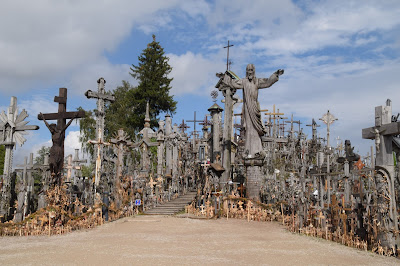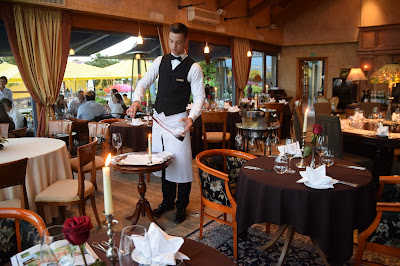6th August, 2016
The ritual placing of the sticker now we could see what we were doing...
Lithuania seems to have been torn apart, destroyed and then torn apart again so often in modern times that the population must be up for a Nobel Tolerance prize. Modern history is very grim here and the people really see being part of Europe as their future guarantee of peace. We had arrived late in the evening - just before the sun went down and we spent the following day visiting the castle at Trakai - more recent rebuilding and noticed the rather quaint wooden houses that seemed to be a local Turkic community that specialized in equivalent Cornish pasties. Funny we never saw any of that in the dark the night before. And then we went off to Vilnius which had a ridiculously high density of churches. Built history seems to be either religious or military - or both. Is that all there is to life? The Vilnius Cathedral had been transformed into a Centre for Atheism during the Communist period with plans to tun it into a Bus Garage - repairs, not storage.

Our next day we decided to visit Kernave, a UNESCO site of pre-historic hill forts.
And then on to the Hill of Crosses which had been a very important site in the modern history of Lithuania where religion aligned itself with rebellion - in some ways like Solidarnosc in Poland . Under communism, Crosses had been erected and then torn down by the Russians and then erected and then bull-dozed etc etc until it became a very potent symbol of freedom and independence whilst under Russian rule. The hill was more a mound and looked man made and that might well have been due to the bull-dozing. There were over a hundred crosses; there are now over two hundred thousand and the tourist shops sell them and you can plant your own. We were not sure how we felt about this: whetted or not this constituted a dilution of the initial statement and, if so, was that important? Was it right that people had their loved ones names written on the crosses as in a cemetery, and not just Lithuanians? Is it really about Paulo from Pisa having been there, or Peter from Pittsburg? or all the pilgrimages from Poland? Is this what happens to sites blessed by the Pope? Should the tourist part have been kept apart from the initial crosses? Most are in wood and some have rotted and fallen over and people pile more on top of them - does this strengthen or weaken the monument? And what about the censorship? there was a Star of David with, if our German was good enough, some very strong words about not too distant German actions and repentance that some people had tried to scratch out...
Overall we were moved by the struggle for Independence and the symbolism of the monument - but somewhat confused by the touristic approach. Maybe the Lithuanians are also confused as to what has happened too? And we thought it would be much bigger. Tricks of photos, we should have known. We hadn't seen a hill for days excluding the hill forts of Kernave.
The ritual placing of the sticker now we could see what we were doing...

And then on to the Hill of Crosses which had been a very important site in the modern history of Lithuania where religion aligned itself with rebellion - in some ways like Solidarnosc in Poland . Under communism, Crosses had been erected and then torn down by the Russians and then erected and then bull-dozed etc etc until it became a very potent symbol of freedom and independence whilst under Russian rule. The hill was more a mound and looked man made and that might well have been due to the bull-dozing. There were over a hundred crosses; there are now over two hundred thousand and the tourist shops sell them and you can plant your own. We were not sure how we felt about this: whetted or not this constituted a dilution of the initial statement and, if so, was that important? Was it right that people had their loved ones names written on the crosses as in a cemetery, and not just Lithuanians? Is it really about Paulo from Pisa having been there, or Peter from Pittsburg? or all the pilgrimages from Poland? Is this what happens to sites blessed by the Pope? Should the tourist part have been kept apart from the initial crosses? Most are in wood and some have rotted and fallen over and people pile more on top of them - does this strengthen or weaken the monument? And what about the censorship? there was a Star of David with, if our German was good enough, some very strong words about not too distant German actions and repentance that some people had tried to scratch out...
Not that we watched it but the recent BBc adaptation of War and Peace wasn't set in St Petersburg at all. Parts were filmed in Trakai, Kernave and Rundales - all of which we visited today. But we will be hitting St Petersburg too - one up on the BBC!
Two in fact as there was the Hairy Bikers Baltic jaunt too. We had the idea but clearly they sorted out the issues of time and funding before us. But they didn't really 'do' St Petersburg as they swapped their product placement Guzzis for a borrowed Ural sidecar in Russia whereas some of us are currently girding our loins for future interaction with Russian Border Control formalities.
Short couple of hours to Riga which seemed to be waking up as we arrived at eleven in the morning. Big on English/Irish pubs here. Almost felt as though they had hosed down the streets. had a good look round - unexpected but very impressive stock of Art Nouveau buildings and a great little museum which was a restored period flat. Pretty good if you think of everything it had probably been through. Apparently the Russians threw out any of the Latvians that had money and were willing to go post-war and everyone else was asked to collectivise on farms. Those that wouldn't lend their hands to this enterprise were then gulag-ed in Siberia. This happened to quite a lot of them. It left a big hole in the workforce down on the farms which was then filled by Russians. Ethnic dilution and now 30% of people living in Latvia are Russian with the highest concentration living perhaps bizarrely in non-agricultural Riga. Can one feel a Crimea coming on?
Further bizarre touch. On arriving outside our hotel on the bike we scared a couple walking on the road in front of us and taking a photo of us. Friends from a neighbouring street in Blackheath. Strange coincidence.
Tallinn in Estonia for lunch the following day and it was by far and away the best of the Baltic State capitals as as Old Town's go. Seemed less hen/stag party town as well. one of the prettiest town squares we have seen and a lot of original, old as in medieval, building stock that seems to have survived. Not that we availed ourselves of any but also a better class of tourist tat too. And some fine restaurants - Ribe - contemporary Estonian cuisine, well worth a visit.














































